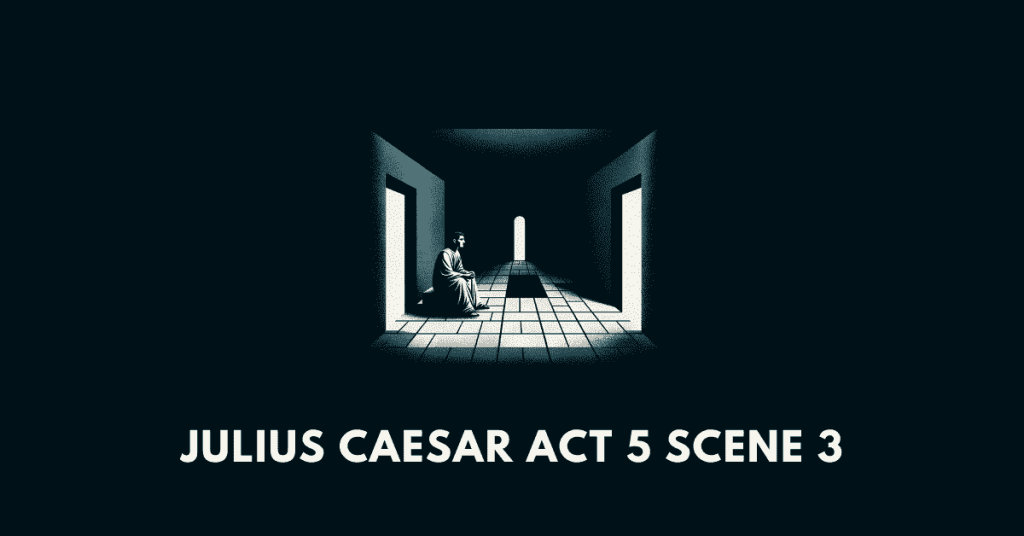Get notes, workbook solutions, summary, questions and answers, and pdf of the drama/play Julius Caesar (Act 5 Scene 4) by William Shakespeare, which is part of ICSE Class 10 English. However, the notes should only be treated as references, and changes should be made according to the needs of the students.
Summary
This scene takes place during the Battle of Philippi, one of the major battles of the Roman Civil War following the assassination of Julius Caesar. The two opposing sides are led by Brutus and Cassius on the Republican side, and Antony and Octavius on the side supporting Caesar.
The scene opens amid the chaos of battle, with soldiers from both armies fighting fiercely. The famous Roman senator and philosopher Brutus tries to rally his countrymen, urging them to “hold up your heads!” However, Brutus soon exits, perhaps to lead the fighting elsewhere.
A young soldier named Cato, the son of the esteemed Marcus Cato, announces himself defiantly as “a foe to tyrants, and my country’s friend.” Clearly inspired by his father’s opposition to Caesar’s increasing powers, young Cato seems determined to fight the tyranny represented by Antony and Octavius.
Another soldier, Lucilius, also proclaims his identity as Brutus himself, shouting “I am Brutus, Marcus Brutus, I! Brutus, my country’s friend!” This creates some confusion on the battlefield.
Tragically, young Cato is soon killed in the fighting. Lucilius laments Cato’s brave death in service of the Republic. Moments later, Lucilius himself is captured by enemy soldiers who mistake him for the real Brutus.
When the victorious Antony arrives, Lucilius continues the deception, telling Antony that Brutus has escaped. Antony seems to respect Lucilius’ loyalty and defiance, calling him “a prize no less in worth” than capturing Brutus himself.
Antony decides to treat Lucilius with respect, saying “I had rather have / Such men my friends than enemies.” As a skilled politician, Antony recognizes the value of winning over honorable foes like Lucilius in the future governance of Rome.
Antony sends his soldiers to search for Brutus and to report back at the tent of Octavius. The scene ends with the Republicans defeated in this pivotal battle, but Brutus still unaccounted for, surviving to fight another day.
Workbook answers
Multiple Choice Questions
1. The father of young Cato was
a. Marcus Brutus b. Marcus Cato c. Antony d. Julius Caesar
Answer: b. Marcus Cato
2. Lucilius yields to Antony’s army because
a. he wants to protect Brutus b. he wants to give Brutus a chance to escape c. he knows defeat is inevitable d. he is exhausted
Answer: b. he wants to give Brutus a chance to escape
3. Antony regards Lucilius to be a
a. traitor b. loyal soldier c. murderer d. coward
Answer: b. loyal soldier
4. Antony would like to have Lucilius as
a. a friend b. an enemy c. a prisoner d. a servant
Answer: a. a friend
5. At the end of the scene Antony will be waiting
a. in the tent of Octavius b. in the battlefield c. in the market place d. at the top of the hill
Answer: a. in the tent of Octavius
Context questions
QUESTION 1: I am the son of Marcus Cato, ho!
A foe to tyrants, and to my country’s friend
I am the son of Marcus Cato, ho!
1. Who is the speaker? Where is he?
Answer: The speaker is Cato. He is on the battlefield, proclaiming his identity and his opposition to tyranny, showcasing his allegiance to his country and his heritage.
2. Who does Lucilius compare the speaker to?
Answer: Lucilius compares Cato to Titinius, suggesting that Cato dies as bravely as Titinius, which honors him as Cato’s son.
3. What has Lucilius offered the soldiers? Why? What does it show about his loyalty towards Brutus?
Answer: Lucilius offers himself to the soldiers, claiming to be Brutus and asking for death, which demonstrates his loyalty to Brutus. This act is designed to protect Brutus, giving him a chance to escape, and shows Lucilius’s dedication and self-sacrifice for Brutus’s safety.
4. What are Antony’s feelings towards Lucilius? How is Antony portrayed as a good general and a statesman?
Answer: Antony admires Lucilius’s bravery and loyalty, viewing him as a valuable asset. Antony is portrayed as a good general and statesman through his recognition of Lucilius’s worth, his desire to have such loyal men as friends rather than enemies, and his strategic decision to keep Lucilius safe, recognizing the importance of loyalty and bravery in governance.
5. What instructions does Antony give to his soldiers at the end of the scene?
Answer: Antony instructs his soldiers to continue searching for Brutus to determine whether he is alive or dead and to report back to him in Octavius’s tent about how events have unfolded.
Extra/additional MCQs
1. The father of young Cato was
A. Marcus Brutus B. Marcus Cato C. Antony D. Julius Caesar
Answer: B. Marcus Cato
10. The death of young Cato is symbolic of the fall of
A. Tyranny B. The Republic C. Brutus’ army D. Antony’s resolve
Answer: B. The Republic
Extra/additional questions and answers
1. Who was young Cato’s father?
Answer: Young Cato’s father was Marcus Cato.
6. What significance does Lucilius’ act of impersonation hold in the story?
Answer: Lucilius’ act of impersonation is a profound demonstration of loyalty and sacrifice. By pretending to be Brutus, he risks his own life to protect his leader, showcasing the deep bonds of trust and camaraderie that exist among those opposing tyranny. This act reflects the themes of honor, loyalty, and the lengths to which individuals will go to protect their comrades and ideals in the face of overwhelming odds. It also highlights the respect that enemies can have for each other, as seen in Antony’s reaction to Lucilius’ bravery.
Get notes of other boards, classes, and subjects

